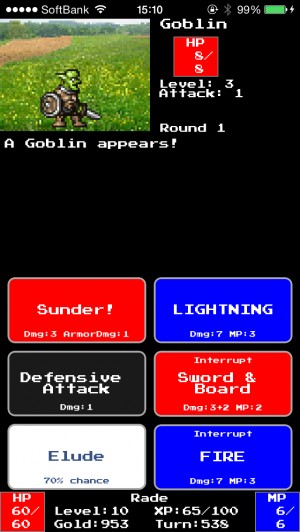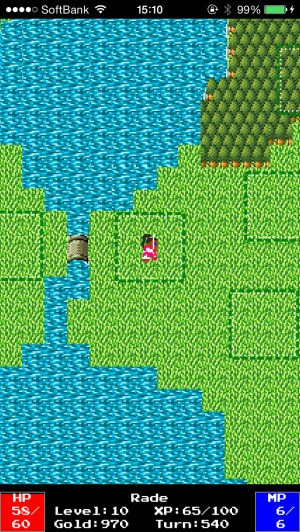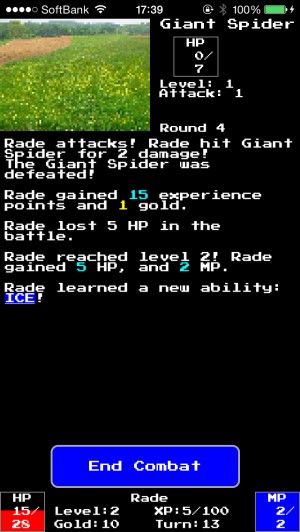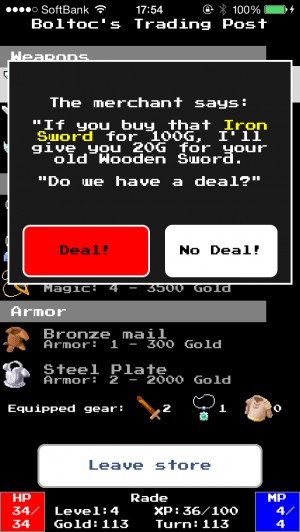 One of the things I love about RPGs is how wide and diverse the genre is. There are so many different things an RPG can do well to make a name for itself, whether it be telling a great story, having deep character customization options to play with, bringing an interesting world to life for players to explore, using interesting combat mechanics to force you to think in new ways, or any other of the genre’s fine traits. Generally speaking, no two RPGs are quite alike, and some of them are so different from each other it’s a wonder we fit them into the same genre at all. I enjoy digging into any RPG and trying to find that thing that makes it special, and even if it’s not to my personal tastes, it’s always interesting to see how it works and who it might appeal to.
One of the things I love about RPGs is how wide and diverse the genre is. There are so many different things an RPG can do well to make a name for itself, whether it be telling a great story, having deep character customization options to play with, bringing an interesting world to life for players to explore, using interesting combat mechanics to force you to think in new ways, or any other of the genre’s fine traits. Generally speaking, no two RPGs are quite alike, and some of them are so different from each other it’s a wonder we fit them into the same genre at all. I enjoy digging into any RPG and trying to find that thing that makes it special, and even if it’s not to my personal tastes, it’s always interesting to see how it works and who it might appeal to.
Vigil RPG (Free) has a very specific appeal. It works well for me, but I can definitely see it not rubbing others in the same way. It openly aims at a retro JRPG vibe, in many ways feeling like something of the first Dragon Quest ($2.99)’s vintage. Like older games in the genre, there’s quite a lot of combat, and it’s a good thing, too, because you’ll need every point of experience you can earn. Although each individual battle involves a reasonable amount of strategy, the attrition that results from fighting your way to your target means that there are somewhat loose level restrictions if you plan to survive. Battles are all one-on-one, so you’re really only having to manage one set of actions at any given time, along with keeping an eye on just a single enemy. While there’s a story, it’s quite sparse and is just an excuse to get you on to your next dungeon and boss. There’s very little character customization involved in leveling up, and equipment upgrades are all linear. These are all very old-school principles, but they’re just one side of Vigil RPG.
 The other side of Vigil RPG shows the kind of savvy that is more commonly found in gaming in its modern context. Lots of modern RPGs, particularly on mobile platforms, make a strong attempt to trim away the excesses of the genre to make something more palatable to a wider audience. Vigil RPG does this in its own unique way. I can’t be sure whether the game is designed the way it is out of developmental realities or intentional design, but I do know one thing: it works. You have a town, but the only things in it serve immediately practical purposes. You touch the place on the map where you want to go, and you’re there. There’s an overworld map, but instead of letting you wander around freely, you move square by square along something like a boardgame path, with new paths opening up as you play through the story. There are a bunch of dungeons, but they too are made up of boardgame-like squares that you move along one step at a time. Each square on these boards has a high chance of starting a random battle, and the outlines around the squares tell you how powerful the enemies there are relative to you.
The other side of Vigil RPG shows the kind of savvy that is more commonly found in gaming in its modern context. Lots of modern RPGs, particularly on mobile platforms, make a strong attempt to trim away the excesses of the genre to make something more palatable to a wider audience. Vigil RPG does this in its own unique way. I can’t be sure whether the game is designed the way it is out of developmental realities or intentional design, but I do know one thing: it works. You have a town, but the only things in it serve immediately practical purposes. You touch the place on the map where you want to go, and you’re there. There’s an overworld map, but instead of letting you wander around freely, you move square by square along something like a boardgame path, with new paths opening up as you play through the story. There are a bunch of dungeons, but they too are made up of boardgame-like squares that you move along one step at a time. Each square on these boards has a high chance of starting a random battle, and the outlines around the squares tell you how powerful the enemies there are relative to you.
Battles are simple, turn-based affairs, but they’re still quite enjoyable since enemies follow certain patterns and give tells as to their next move. It’s very satisfying to learn a new enemy’s bag of tricks and effectively shut them down every time you see them afterwards. You don’t have too many options to worry about in any given battle, since you’re always limited to a selection of six different moves at one time. One of these will always be an attack that requires no MP, one will always be a type of defending move, one will always be some type of running away command, while the other three are left to special moves that usually consume MP. Managing your MP is vital in Vigil RPG as you have little of it and many of your important moves use it. During boss battles, it will restore a little each turn, but otherwise, it only recovers outside of battle. Your HP is also precious as you generally have no means of restoring it outside of the inn in the town or certain lucky finds in dungeons. One of the keys to success in the game is learning the ins and outs of each enemy so you can minimize the impact done to your HP.
 As you gain levels, you’ll unlock new abilities and skills. You can customize which ones you have in your active menu by visiting the training grounds in the town. Certain moves are better for countering particular enemies, and you don’t have enough slots to assign a foil for all of them, so you have to consider where you’re headed and set yourself up appropriately. There are plenty of options and lots of different monsters to think about, leading to a very enjoyable battle system. Importantly, battles are either long and exciting or short and simple, depending on how prepared you are, so you’re never wasting your time doing a lot of dull combat. Most normal battles don’t last much longer than two or three turns, and once you’ve figured out how best to take on a specific enemy, it’s pretty easy to take them out in one or two attacks.
As you gain levels, you’ll unlock new abilities and skills. You can customize which ones you have in your active menu by visiting the training grounds in the town. Certain moves are better for countering particular enemies, and you don’t have enough slots to assign a foil for all of them, so you have to consider where you’re headed and set yourself up appropriately. There are plenty of options and lots of different monsters to think about, leading to a very enjoyable battle system. Importantly, battles are either long and exciting or short and simple, depending on how prepared you are, so you’re never wasting your time doing a lot of dull combat. Most normal battles don’t last much longer than two or three turns, and once you’ve figured out how best to take on a specific enemy, it’s pretty easy to take them out in one or two attacks.
Should you fall in battle, you’ll find yourself back at the town with your gold, experience, and everything else intact. The only loss is time, but that loss comes in both the real and in-game sense. You see, Vigil RPG keeps track of how many turns you take, and rewards for finishing quests vary according to how soon you’re able to finish them. Dying gives you a major turn penalty, enough to knock you down to the next star ranking in many cases. There are Game Center achievements connected to this system, but the quests also offer gold in varying amounts according to how many stars you clear them with. Earning higher star rankings on each mission will allow you to upgrade your equipment sooner, increasing your survivability and helping you take care of the next quest that much sooner. It’s a good set-up because if you just want to make your way through the game at your own pace, you’ll eventually get there if you’re persistent, but if you want to reap the best rewards and finish things more quickly, the game incentivizes that nicely.
The game has an overall creative design that does an excellent job of capturing the essence of early JRPGs in a condensed format. It’s very easy to play one-handed, it auto-saves after every turn, and your next goal is always clear in case you happen to forget. It’s not the longest RPG around, but it does last a bit longer than its chief inspiration, Dragon Quest. The clever design is offset somewhat by the production values. This is a one-person developer, so the art and music are simple, licensed, or more frequently, both. There’s a bit of inconsistency to the presentation as a result, though I think if you come into it with 8-bit expectations, you’ll be just fine. I mentioned Game Center implementation briefly earlier, but to expand on that a little, Vigil RPG has full support for leaderboards based on the number of turns it takes you to reach certain milestones, and a list of interesting and challenging achievements to shoot for.


Some people probably aren’t going to gel with its patchwork presentation and narrow focus, but I’d venture to say that if you’re the type of person who appreciates NES-era JRPGs, you’ll get your money’s worth out of Vigil RPG. It’s incredibly streamlined, but it’s been done thoughtfully, leaving an entertaining, challenging quest that pushes a lot of the right buttons for me. It does well in scratching my occasional, admittedly paradoxical itch for pick-up and play RPGs with a bit of substance to them.